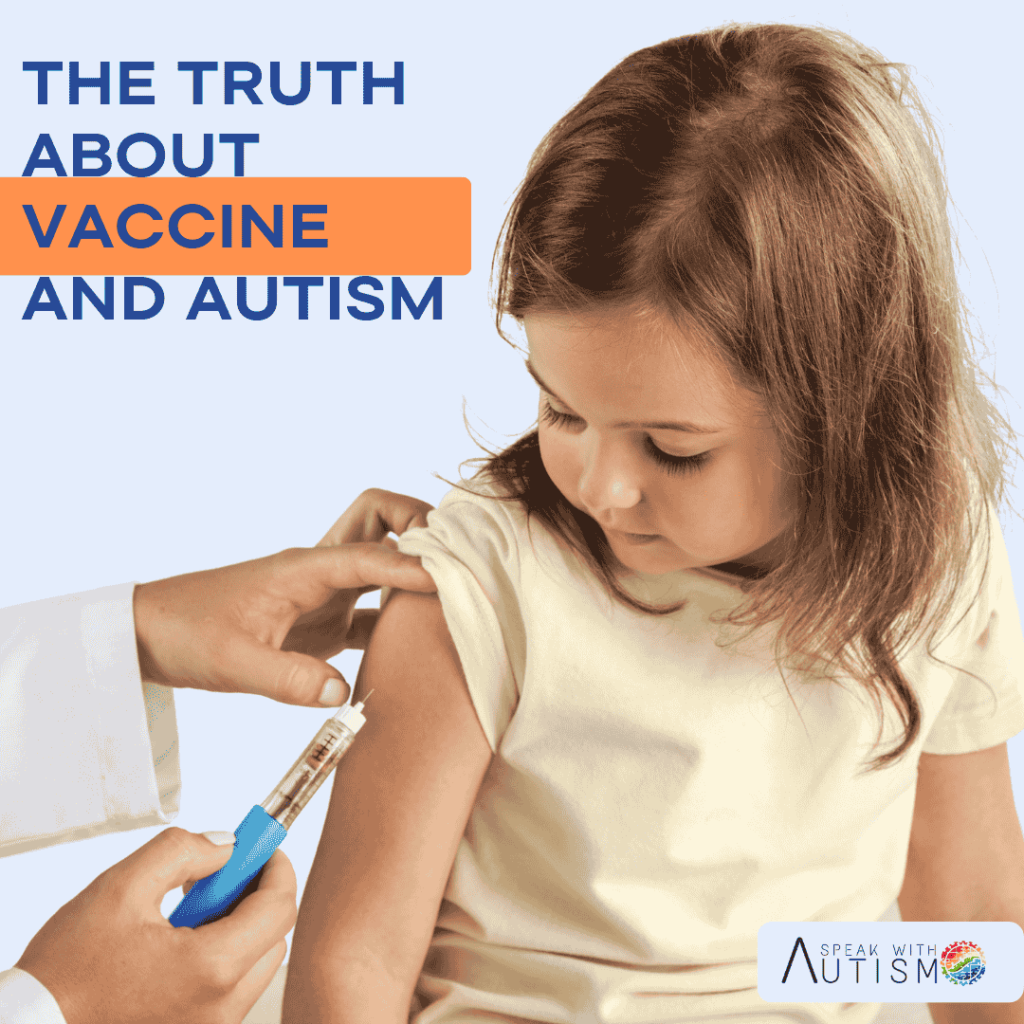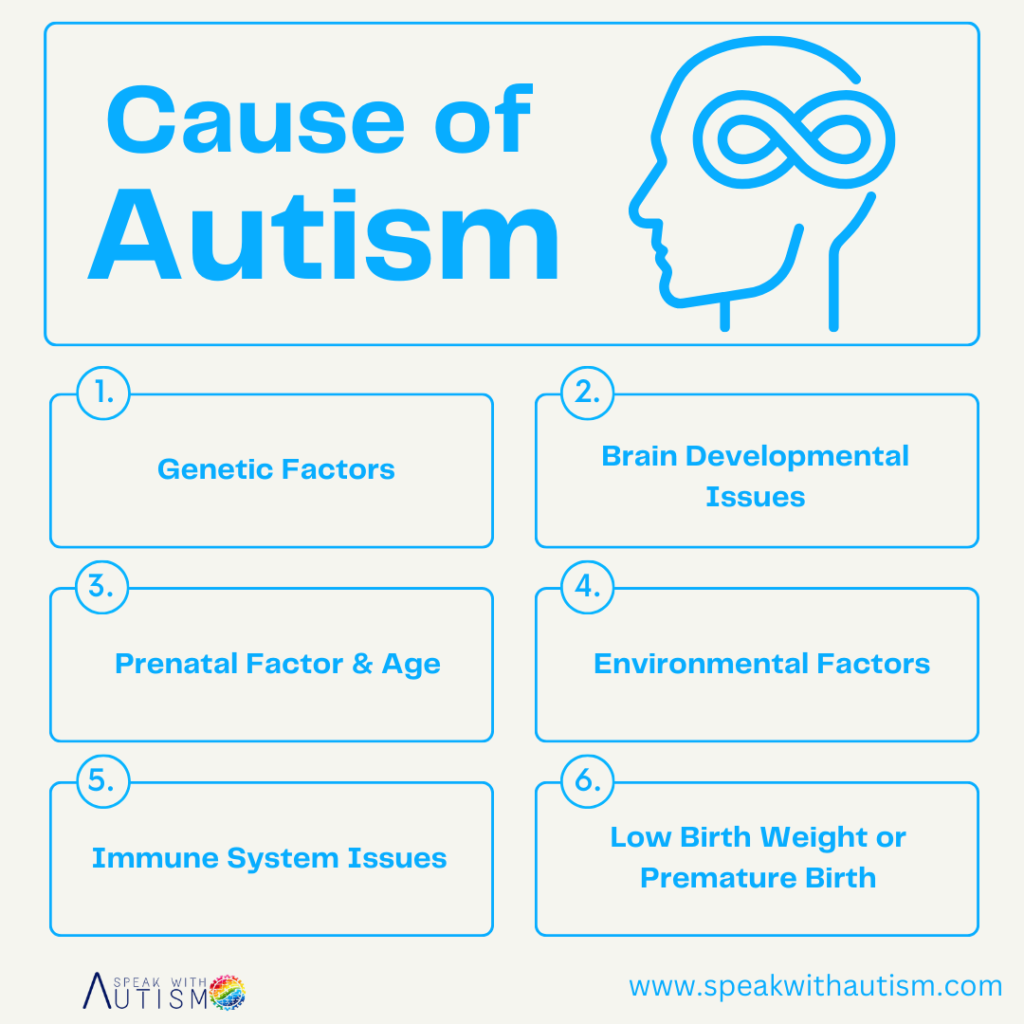The connection between Vaccine and Autism has been a highly debated and controversial topic. However, health organizations around the world, such as the CDC (Centers for Disease Control and Prevention) reports and World Health Organization (WHO) reports, have consistently worked to prove that there is no link between vaccines and autism.
Table of Contents
This topic has caused significant confusion and fear among parents and the medical community. Due to widespread misinformation, parents often worry about whether their child’s autism, ADHD (attention deficit hyperactivity disorder) or other mental conditions could have been caused by vaccines. In this blog, we will address this concern, explore the origins of this debate, and clarify the connection between vaccines and autism.

Why and when did the confusion about autism and vaccines start
The confusion between autism and vaccines began in 1998 when a study linked the MMR (measles, mumps, and rubella) vaccine to autism. Andrew Wakefield’s study claimed that the vaccine could promote autism in children, causing widespread fear and confusion around the world.
As a result, many parents began to avoid vaccinations. However, further research revealed that Andrew Wakefield’s study was fraudulent. His data was manipulated, and the findings were unreliable. In 2010, his medical license was revoked, and the study was officially retracted.
Despite this, misinformation persists today, which has been exacerbated in the digital age. Many parents are still afraid of vaccines due to skepticism. Organizations like the CDC (Centers for Disease Control and Prevention) and the World Health Organization (WHO) are working tirelessly to dispel these myths and emphasize the safety of vaccines. Parents need to stay informed and get their children vaccinated to protect them from preventable diseases.
What were the issues in the study
The sample size was too small: Wakefield’s study was based on only 12 children, which is an insufficient number for any scientific research.
Promoting his own private vaccine: It was later discovered that Wakefield was receiving financial benefits for the legal cases. He intentionally presented incorrect data so that he could promote his own private vaccine.
Unreliable and inaccurate: When other scientists tried to replicate Wakefield’s study, they did not get the same results. This was proof that the study was unreliable and inaccurate.
Ethical violations: Wakefield also ignored consent and ethical guidelines, which is a serious issue for medical research.
Organizations Scientific Research?
Extensive scientific research conducted by major global organizations has conclusively proven that vaccines do not cause autism. These studies carried out on a large scale, aim to ensure the safety and efficacy of vaccines. The following organizations have led the efforts:
- World Health Organization (WHO): Ensures vaccine safety worldwide and emphasizes their importance in disease prevention.
- Centers for Disease Control and Prevention (CDC): Conducts in-depth studies to guarantee vaccines are safe and do not contribute to autism.
- National Institutes of Health (NIH): Supports and funds large-scale research to address vaccine concerns.
MMR Vaccine use
The MMR vaccine (Measles, Mumps, Rubella) has played a crucial role in preventing severe illnesses that once caused widespread mortality among children. Before the introduction of vaccines, diseases like measles, mumps, and rubella led to significant complications and deaths. Thanks to the MMR vaccine, these diseases have been largely controlled, protecting millions of lives globally.
Global Increase in Measles Cases (2023)
- The main reason for the increase in epidemic outbreaks around the world is the decline in vaccination. In 2023, there were 10.3 million cases worldwide, a 20% increase from 2022. This jump is due to millions of children not taking their precious vaccine dose.
- The primary reason is that more than 22 million children missed their first dose of the measles vaccine. Only 74% of children worldwide received the second dose, far below the 95% needed for herd immunity.
You can also read more details about Measles cases in different countries due to misinformation about vaccines. I will provide the following sources that are:
- CDC (Centers for Disease Control and Prevention) Reports, Title is “Measles Cases and Outbreaks” for this visit CDC Measles page
- World Health Organization (WHO) Reports, the title is “Europe Measles Status Report 2019”, read WHO report on Measles
- UNICEF Report: Child Immunization Coverage
Importance of vaccine in human life
Vaccines have played a significant role in preventing diseases worldwide. They are essential for strengthening the body and boosting our immune system, making it more resilient to infections when exposed to viruses. Vaccines should be administered as per the recommended schedule. If you have any concerns or doubts about vaccines, it’s important to discuss them with your pediatrician. They can provide accurate information and address your concerns effectively.
What is the cause of Autism

Genetic Factors
- If a parent has autism, the child is more likely to have autism.
- Genetic disorders such as Rett syndrome, fragile X syndrome, and tuberous sclerosis are associated with autism.
- Spontaneous changes in genes during pregnancy or early developmental periods of kids can affect brain structure and function.
Brain Developmental Issues
- There may be differences in brain structure or brain signaling pathways, such as abnormal development of the cerebellum and amygdala.
- The regulation of neurotransmitters such as serotonin and dopamine may affect brain signaling, which could potentially be responsible for autism.
Prenatal Factor and Prenatal Age
- Health issues during pregnancy (such as diabetes or some infection) or toxic exposure like heavy metals or air pollutants can affect the baby’s brain development.
- Increasing the parents’ age, especially the father’s age, may increase the risk.
Environmental Factors
- Older parental age, exposure to harmful medications (such as valproic acid or thalidomide) during pregnancy, and pollutants increase the risk of autism.
- Exposure to pesticides, plastics, or other environmental chemicals could contribute to children’s developmental issues.
Immune System Issues
- Maternal inflammation or autoimmune disorders during pregnancy affect fetal brain development of the baby.
Myths Debunked
- Vaccines and parenting styles were once falsely linked to autism, but this has been proven scientifically wrong.
Pre-mature Birth
- Pre-mature birth, low birth weight, and oxygen deprivation during delivery can also associated with autism.
Conclusion
There is no scientific evidence linking autism and vaccines. Vaccines are safe and protect children from life-threatening diseases. In today’s world, misinformation spreads easily, but it is crucial to rely on facts and science to safeguard our children from preventable illnesses. Make informed decisions with clarity and encourage others to do the same to ensure children receive necessary vaccinations.
Children with autism already face challenges like gastrointestinal issues, sleep disorders, and behavioral difficulties. If they are not vaccinated, they may be at greater risk of additional health problems. This is why it is vital for parents to stay proactive and provide their children with a protected, disease-free environment. Vaccination plays a key role in securing their health and future.
Frequently Asked Questions (FAQs)
What causes Autism?
The causes of autism are not fully understood, but some factors are responsible for it. Genetic factors may be a major cause behind autism, with family history being seen to have an effect, or Genetic disorders such as Rett syndrome, fragile X syndrome, and tuberous sclerosis are linked with autism. Health issues during pregnancy, and toxic exposure like heavy metals, and air pollutants can affect the baby’s brain development. Abnormalities in brain development or the effect of neuron connectivity are also associated with autism. Increasing the parents’ age, especially the father’s age, may increase the risk. Nutritional deficiencies, such as folic acid deficiency, may affect during pregnancy.
What is the MMR vaccine and Autism link?
The confusion between autism and vaccines began in 1998 when a study linked the MMR (measles, mumps, and rubella) vaccine to autism. Andrew Wakefield’s study claimed that the vaccine could promote autism in children, causing widespread fear and confusion around the world. Further research revealed that Andrew Wakefield’s study was fraudulent. His data was manipulated, and the findings were unreliable. In 2010, his medical license was revoked, and the study was officially retracted. Children with autism already face challenges like gastrointestinal issues, sleep disorders, and behavioral difficulties. If they are not vaccinated, they may be at greater risk of additional health problems.
